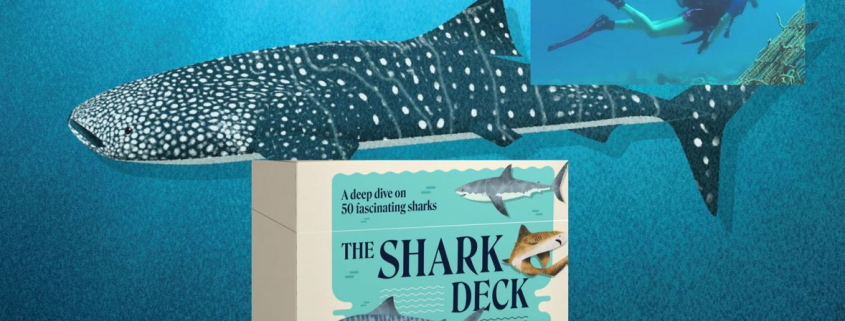‘More than just teeth’: Shark Deck inspires respect for sharks
Spotting a shark while snorkelling as a child then, in a flash, realising it was gone was an early lesson on these supposed ‘monsters of the deep’ for marine biologist Dr Charlotte Birkmanis.
“I was 10 when I first saw a shark and I remember thinking that here was an animal that I’m supposed to be afraid of, but it couldn’t get away fast enough,” Dr Birkmanis said.
It fuelled a passion for ocean life in the scientist, who recently released Shark Deck, featuring 50 species of sharks with images of sharks on one side and information, including their diet, size, and one of her ‘fin facts’ on the back.
When the Director of the philanthropic Jock Clough Marine Foundation wrote Shark Deck, she made a point of including lesser-known species as well as the better-known tiger and great white sharks.
“There are more than 530 species of sharks in the world, yet we commonly only hear about a handful of them,” she said.
The variety is extraordinary —there is the bus-sized whale shark, the yellowish lemon shark and the tiny ‘glow in the dark’ pocket shark.
“The more I have learned about sharks, the more I am fascinated by them and I love sharing this with others through books, radio and television,” Dr Birkmanis said.
“I do a lot of public talks and interviews about sharks and our oceans, and I try to get people to think about sharks as more than just their teeth. I like to remind them the largest sharks eat plankton.”
Despite the facts about the animals, headlines scream about sharks stalking, lurking, attacking and prowling. They are described as rogues and monsters.
Many have alarmingly low populations and are threatened so Dr Birkmanis was delighted when The Washington Post recommended Shark Deck as “engaging” with “cool facts about the shark’s biology, habitat, range and more”.
Dr Birkmanis, an Adjunct Research Fellow at The University of Western Australia’s Oceans Institute, said the interest shown for the animals when she gives talks to schools and community groups and shares information on television and in social media was encouraging. So much so she’s been given the title of ‘PR Manager for sharks’.
“I think there is a genuine interest in sharks, but a lot of the scientific material is inaccessible,” she said.
Dr Birkmanis has tagged and dived with sharks across the Indian Ocean, in places such as the Chagos, Mozambique and South Africa, including white sharks.
“The way they move is incredible,” Dr Birkmanis said.
She is now continuing her research on sharks as a Postdoctoral Research Fellow with the Max Planck Centre, looking at shark movement, behaviour and how they may even be able to help us heal.
The Shark Deck follows Dr Birkmanis’ children’s book Little Shark Lulu is sleeping, a fun fact-filled fable about what goes on in the ocean when the sun goes down, told through the eyes of a little shark named Lulu. Notably Lulu has no teeth.

